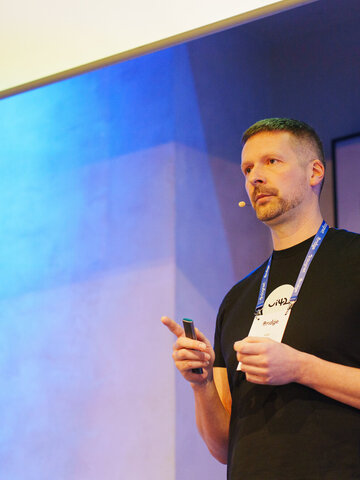DevOps
What does it mean
DevOps, a compound of the words "Development" and "Operations", is an approach and system designed for managing software processes, which consists of unifying the development and operation of applications. This concept is based on an ecosystem, culture, and methodologies that support synergistic collaboration between teams focused on software development and teams that take care of its deployment and operation. DevOps aims to accelerate the processes of software development and deployment, while simultaneously increasing their quality and efficiency with the goal of eliminating errors. This approach allows organizations to respond more flexibly to market demands, reduce errors, and improve customer satisfaction through continuous integration and automation of procedures.
More info
The DevOps ecosystem encompasses a wide range of elements, from tools and technologies to people and processes that work together for efficient software development and management.
Read practical examples of this ecosystem that illustrate how various components and stakeholders interconnect within DevOps:
Processes in DevOps
Continuous Integration (CI): Developers regularly upload code changes to a central repository, where tests are automatically run to verify the functionality and reliability of the code.
Continuous Delivery (CD): After successfully passing the tests, the code is automatically moved to the testing and then to the production environment, reducing the time needed to deploy new features.
Automated Testing: The use of tools to automatically perform tests to ensure software quality. This step includes unit tests, integration tests, and functional tests.
Commonly Used Tools in DevOps
Jenkins: A continuous integration tool that allows for the automation of software builds and testing.
Docker: A containerization platform that enables developers to package applications into containers, ensuring environment consistency throughout development, testing, and deployment.
Ansible: A configuration automation tool that simplifies server management and application deployment.
Stakeholder Roles in DevOps Infrastructure
Software Developers: Responsible for writing, testing, and maintaining code, code review, writing automatic and selenium tests.
Operations Engineers (Ops): Ensure that systems and infrastructure are available and operate efficiently in the production environment.
Security Engineers (DevSecOps): Integrate security practices directly into the development and operational processes, ensuring that security is part of every phase of software development.
Project Managers: Define product requirements, prioritize features, and ensure that development teams understand business objectives.
Testers: In addition to automated testing methods, they also provide human, manual testing. They often go through the software or application in a different, non-standard way to uncover possible errors in the behavior of the application or code.
Collaboration in a DevOps environment is key communication between all stakeholders. Regular meetings, such as stand-ups or retrospectives, help keep teams aligned and focused on common goals. Tools like Slack or Microsoft Teams support this continuous communication and collaboration. These elements show how DevOps integrates people, processes, and technologies to support rapid, yet stable software development and deployment in a dynamic and highly competitive environment.
Latest news
Contact us
Don't miss out on the latest news from the world of UX, programming, analytics, and marketing.











